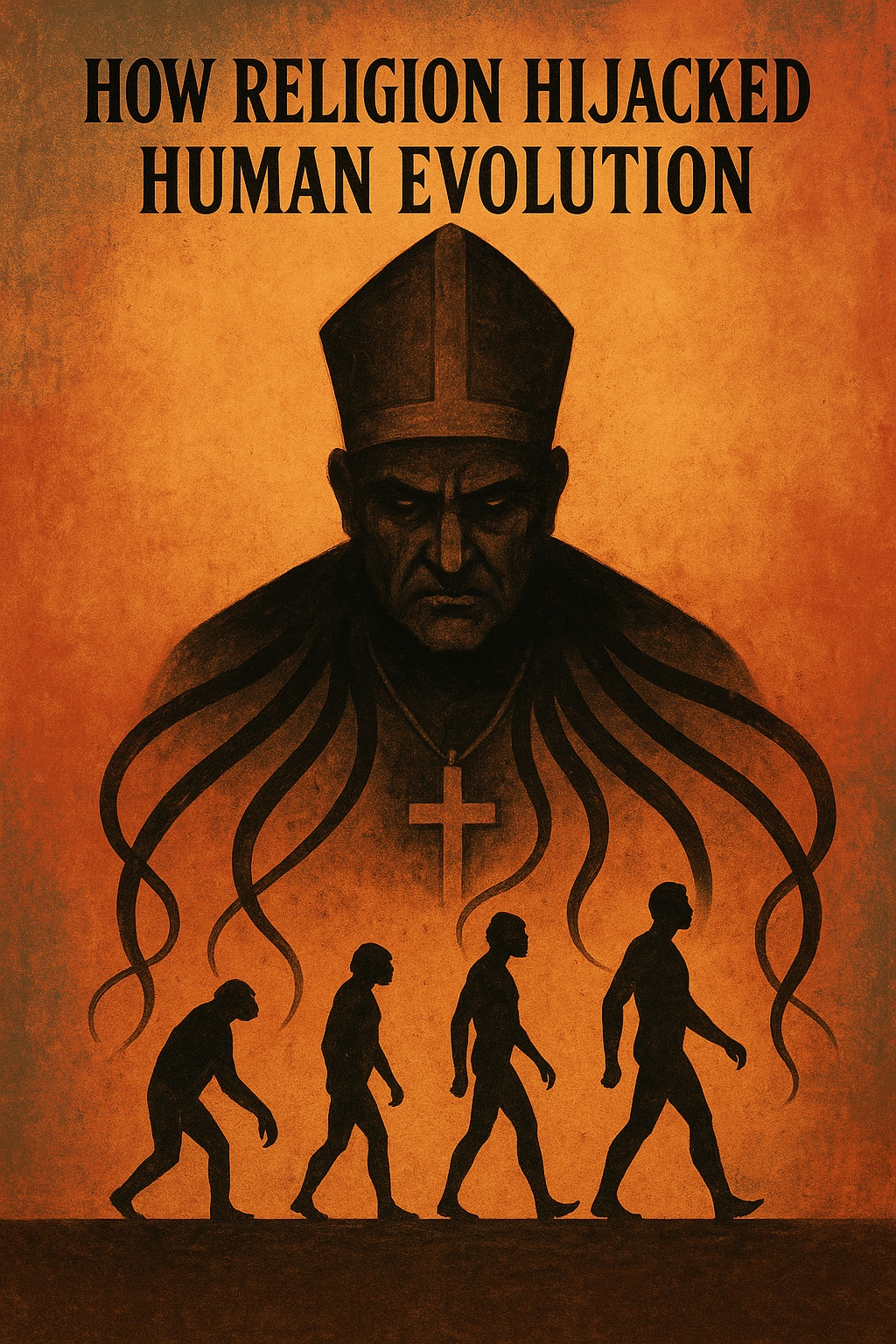Religion did not just emerge from human evolution. It hijacked it.
Belief systems captured the very instincts that helped humanity survive and redirected them toward submission, hierarchy, and guilt. The result was a civilization ruled not by reason but by fear. What began as a coping mechanism became the most powerful parasite in human history.
The birth of belief from survival instinct
Early humans lived surrounded by threats they could not understand. Lightning, death, and disease seemed random. The brain, designed to search for patterns, invented explanations. When thunder struck, it looked like anger. When crops failed, it looked like punishment. Fear created gods before logic could challenge them.
This pattern-seeking brain had one goal—reduce anxiety. It turned chaos into meaning. It invented rituals to regain control. Sacrifices, prayers, and taboos gave early societies emotional security. Religion worked like a mental anesthetic. It did not reveal truth but made fear bearable.
From cooperation to control
At first, shared rituals kept groups together. They increased trust and discipline. A tribe that prayed together hunted better and shared food more reliably. Cooperation brought survival advantage. But as societies expanded, cooperation turned into obedience.
Shamans became priests. Priests became rulers. The language of gods became the language of authority. Religion stopped serving the group and began serving its leaders. Rituals that once united started dividing. The sacred became a weapon. The tribe became a hierarchy. Humanity entered an age where obedience to imaginary beings meant safety from real punishment.
The moral parasite
Morality existed before religion. Evolution had already carved fairness, empathy, and cooperation into the brain. Hunter-gatherers punished freeloaders and rewarded generosity long before any priest spoke about sin. Yet religion stole this natural morality and claimed ownership.
It transformed inner conscience into divine surveillance. Every moral instinct became an opportunity for control. Goodness turned into obedience. Disobedience became guilt. Religion inserted itself between instinct and action. The result was a new kind of morality—external, fearful, and manipulable. Humans no longer acted out of empathy but to avoid hell.
Reproduction, dominance, and sexual control
Religion quickly invaded the most private human sphere—sex and reproduction. It declared women impure and men sinful. It replaced natural mating strategies with divine rules. Virginity became virtue. Lust became crime. Marriage became property.
These dogmas served a biological function. They stabilized inheritance, suppressed competition, and gave male elites control over lineage. The church did not abolish lust; it weaponized it. Every desire became a sin that only the institution could forgive. In doing so, religion redirected evolution itself—favoring obedience over independence, guilt over curiosity, and conformity over innovation.
Religion as a genetic filter
Over centuries, religious societies punished nonconformists. Doubters were silenced. Heretics burned. Rebels erased from memory. This constant selection for obedience acted like a genetic filter.
Societies rewarded faith and punished skepticism. Over generations, the balance shifted. The brave, the curious, and the questioning often died early. The submissive survived. Human evolution began to lean toward docility. Not enough to change anatomy, but enough to influence behavior. The clever risk-takers who once invented tools learned to hide their thoughts.
Evolutionary mismatch in the modern world
The same instincts that once held tribes together now tear global civilization apart. Religious loyalty still divides nations. The same fear of heresy fuels political purges and online mobs. Ancient instincts meet modern technology, and the result is chaos.
Religion once gave cohesion to small bands. Today it gives justification to mass violence. It turned the fear of nature into the fear of difference. Humanity still behaves like a tribe, just armed with drones and nuclear codes. The mismatch between prehistoric brains and modern institutions keeps morality thousands of years behind progress.
The alliance of priests and power
Every empire found its priesthood. Religion offered rulers legitimacy, and rulers offered religion protection. Together they built the machinery of control. Temples collected taxes before banks existed. Confession replaced surveillance before cameras were invented.
Even secular states inherited this structure. Ideologies today function like religions. Nationalism, patriotism, or party loyalty serve the same emotional role—faith without evidence, belonging without thought. The logic of religion outlived its gods. Power learned that obedience works best when disguised as virtue.
The digital resurrection of faith
The twenty-first century revived religion’s method without its theology. Algorithms reward moral outrage, emotional certainty, and tribal belonging. Social networks act like digital churches where users preach and punish heresy. Every like is a prayer. Every cancelation a public burning.
Technology did not kill religion. It mechanized it. The human brain still seeks sacredness, and the algorithm supplies it on demand. Once again, emotional belief defeats rational thought. The old priesthood has been replaced by invisible systems of control that know our fears better than any god ever did.
The future: Reclaiming evolution
Humanity cannot evolve further while trapped in obedience. The task is not to destroy religion violently but to outgrow it mentally. Evolution gave humans empathy, intelligence, and curiosity. Religion chained them to fear.
To reclaim evolution, we must separate morality from mythology. Cooperation must be rebuilt on truth, not illusion. Compassion must come from reason, not guilt. Freedom begins when we stop kneeling.
Human evolution was never meant to end in worship. It was meant to end in understanding.

Leave a Reply